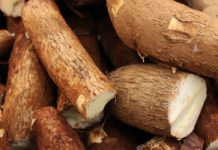What Are Chickpeas?
Chickpeas, also called garbanzo beans, are a variety of legumes that go well in various recipes. They have a nutty taste and grainy texture, and they are highly nutritious. Let`s see how beneficial it is to consume chickpeas.
12 Health Benefits of Chickpeas
Improves Digestive Health
Chickpeas contain soluble fiber which has some healthy impact on digestive health. Soluble fiber is necessary for maintaining the activity of healthy bacteria in the gut, hence preventing irritable bowel syndrome and other digestion issues. Soluble fiber also reduces the risk of colon cancer.
Enhances Weight Loss
Chickpeas are low in calories and fats, making them perfect to incorporate into your diet if you are particular about weight loss.
Curbs Appetite
Consuming chickpeas helps you curb appetite by keeping you full for hours. This reduces uncontrolled eating and helps you maintain a healthy weight.
Maintains Blood Sugar Levels
Chickpeas have a low glycemic index, which makes them healthy for diabetics. Their dietary fiber and protein contents control sugar spikes in the blood. Even more fascinating is the fact that chickpeas have nutrients that make them potent at preventing type-2 diabetes.
Maintains Cholesterol
Triglyceride and LDL (not-so-healthy) cholesterol are some of the factors responsible for heart diseases. Consuming chickpeas protects the heart and wards of diseases. Chickpeas particularly lower cholesterol levels and improve cardiovascular health.
Increases Bone Density
You can maintain bone health by consuming chickpeas. This legume contains magnesium, manganese, phosphorus, and copper, all of which strengthen the bones and ward off bone diseases such as osteoporosis.
Fights Inflammation
There are a number of factors that lead to inflammation in muscles and joints. Consuming chickpeas regularly enriches the body with adequate minerals and vitamins to combat inflammation.
Balances Hormones
Chickpeas contain phytoestrogens which make it easier to deal with menopausal and postmenopausal symptoms such as night sweats, hot flashes, and mood swings. Regular consumption of chickpeas enables the body to sort out issues of hormonal imbalance.
Promotes Hair Growth
 Chickpeas are rich in protein and iron, two nutrients that are required for hair growth and quality. People who consume chickpeas regularly enjoy hair benefits. Note that it is better to grow and improve hair quality through natural means.
Chickpeas are rich in protein and iron, two nutrients that are required for hair growth and quality. People who consume chickpeas regularly enjoy hair benefits. Note that it is better to grow and improve hair quality through natural means.
Combats Free Radicals
Chickpeas are enriched with manganese, hence they combat free radicals which are responsible for premature aging. The manganese content, along with molybdenum, prevents organ deterioration and enhances skin rejuvenation. Do you want to eliminate those wrinkles, fine lines, gray hair, and other aging signs? Then incorporate chickpeas into your diet.
Improves Eyesight
Chickpeas contain nutrients that boost eye health. You can consume it regularly to combat weak eyesight and lower the risk of age-related eye disorders.
Chickpea Benefits for Pregnant Women
Chickpeas are one of the safest foods to eat during pregnancy. Chickpeas contain nutrients such as folic acids, minerals, and proteins to mention a few, which the legume perfect for pregnant women. Note, however, that it is highly important to cook chickpeas till it softens before consuming it during pregnancy. Let`s see how chickpeas benefit pregnant women and fetus.
Prevents Neural Tube Defects
Chickpeas are rich in folate (folic acid) which is required for preventing neural tube defects such as anencephaly and spina bifida which pregnant women are at risk of in their first month.
Provides Energy
Tiredness is not strange during pregnancy. A serving of chickpeas contains iron, proteins, and required healthy levels of calories, enough to give strength. The black variety of chickpeas particularly provides the levels of strength required during pregnancy.
Enhances Brain Development
Chickpeas contain choline, a micronutrient that aids brain development and the building of healthy nerves. Chickpeas enhance the development of fetus` brain and spinal cord.
Balances Blood Pressure
 High blood pressure increases the risk of heart diseases. Regular consumption of chickpeas balances blood pressure due to the presence of potassium, magnesium, and zinc. Chickpeas also generally improve heart health.
High blood pressure increases the risk of heart diseases. Regular consumption of chickpeas balances blood pressure due to the presence of potassium, magnesium, and zinc. Chickpeas also generally improve heart health.
Prevents Anemia
Anemia is a condition which occurs as a result of a fall in red blood cell count, or as a fall in hemoglobin value. Iron is popular for the prevention of anemia, and chickpeas are rich in iron which boosts red blood cells. This is quite beneficial for pregnant women.
Overall Fetus Health
Chickpeas ensure the development of fetus` bones and cartilage, and aid cell production and the metabolism of carbohydrates and amino acids. They generally promote the health of the fetus.
Tips for Cooking and Eating Chickpeas
Here are tips that will make you appreciate chickpeas better.
- To cook chickpeas, first, soak them in water overnight.
- Boil the soaked chickpeas afterward for about 30 minutes, sautéing it with spices.
- If what you have is canned chickpeas, simply open it and eat. Note that canned chickpeas are not safe for pregnant women.
- You may have chickpeas with some yogurt, cucumber or raisins to enjoy various great tastes.
Side Effects of Chickpea
Here are some of the common side effects of consuming chickpeas, especially in cases of excess consumption.
Risk of Allergies
Chickpeas belong to the same family as soybeans, hence people who are allergic to the latter may find chickpeas disturbing. Common chickpeas allergies are nausea, stomach upset, vomiting, and itchy skin. For starters, trying a little amount and observing the body`s reaction may be safe.
May Cause Stomach Ache
Inasmuch as chickpeas improve digestion, please note that excess consumption may lead to stomach ache. This ache is characterized by pain around the navel.
May Cause Gas and Bloating
Excess consumption of chickpeas causes accumulation of gas in the stomach, which is evident in bloating.
May Cause Diarrhea
Excessive consumption of chickpeas can cause diarrhea. Sometimes, a symptom such as stomach cramps first occurs when chickpeas consumption is about to lead to diarrhea.
18 Chickpea Facts
- Chickpeas have many other names such as garbanzo beans, Bengal grams, Ceci beans, Kabuli chana, and Egyptian peas.
- Records show that people in the Middle East cultivated chickpeas since 7500 BC.
- Chickpeas come in varieties and colors such as red, brown, black, and green.
- Chickpeas are beneficial agriculturally by providing a natural organic method of breaking the disease cycle in wheat and barley crops.
- Chickpeas are quite versatile. You can eat them canned, roasted, dried, hot, or cold. You may also add them to soups, salads, and stir-fries.
- India is the world`s highest chickpea-producing nation, with Australia coming after.
- The stem of the chickpea plant can reach a height of 10 to 20 inches.
- Chickpea has pinnate leaves that have about seven pairs of leaflets.
- The leaves of chickpea are green, covered with hairs, and toothed on the edges.
- Flowers of chickpea can be white, pink, or violet.
- Chickpea flowers are bisexual and self-pollinate.
- The seeds of chickpea can be globular, irregular-shaped, and may have a smooth or rough surface. They may also have a cream or yellow-brownish color.
- Asians use green parts of the chickpea plant and its immature pods in their cuisine.
- Discarded husks, together with green and dry stems of chickpea are used as animal fodder.
- Chickpea completes its life cycle in a year.
- The stems, leaves, and pods of chickpea excrete a fluid that contains malic and oxalic acids which have aphrodisiac properties. They also treat flatulence, diarrhea, warts, and hypercholesterolemia.
- In Chile, people use a mixture of cooked chickpeas and milk to treat diarrhea in infants.
- The leaves of chickpea are used in manufacturing blue dyes.




